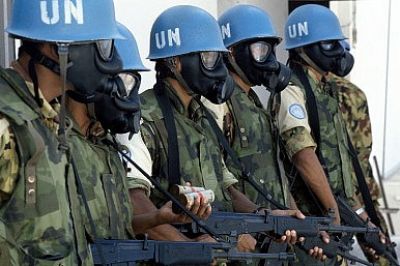"A consistent theme from the earliest days of the Trump administration was the intent to lower the amount that America pays for United Nations peacekeeping.
During her confirmation hearing, Ambassador Nikki Haley repeatedly said that the U.S. contribution to the peacekeeping budget was too high and should be lowered to 25 percent. The current U.S. budget is at 28.5 percent. President Donald Trump's budget blueprint also stated that 'the U.S. would not contribute more than 25 percent for U.N. peacekeeping costs.'...
The tough task of changing the U.N. scale of assessments lies ahead and will require a collaborative effort in New York, in foreign capitals, and on Capitol Hill.
But first, Americans should care about reducing America's peacekeeping dues for two reasons:
1.) The U.S. is paying far more than other states...Currently, the U.S. peacekeeping assessment is about 28.5 percent. This is more than 185 other U.N. member states combined and more than all of the other permanent members of the Security Council combined. Although the U.N. assessments are supposed to be based on the 'capacity to pay,' current disparities in assessments have some governments paying $8,000 for U.N. peacekeeping while the U.S. is charged over $2 billion. Although it is reasonable for wealthier countries to pay more, the privilege of U.N. membership should cost more than an inexpensive car...
2.) Cost savings. Although it does not sound like much, the 3.5 percentage point difference between 25 percent and 28.5 percent of the U.N. peacekeeping budget actually translates into hundreds of millions of dollars each year.
Under the current peacekeeping budget of $7.87 billion, America would save more than $270 million. The failure to reduce the U.S. peacekeeping assessment to 25 percent by 2007 ... has cost American taxpayers well over a billion dollars...
While the peacekeeping budget will hopefully go down under Haley, who has made clear her intent to review the size and mandates of U.N. operations and close unnecessary missions, the demand for expensive U.N. peacekeeping missions will continue into the foreseeable future. Thus, pressing the U.N. to reduce America's peacekeeping assessment has the potential to save American taxpayers billions of dollars...
To avoid the failure of the past eight years, a different approach is necessary. The new scale will be debated and adopted over the next 18 months. Other member states and the U.N. leadership need to know now that the U.S. is serious. Thus, the decision to enforce U.S. law capping peacekeeping payments at 25 percent comes at a perfect time to supplement America's diplomatic efforts.
The short-term result will be arrears. But, as we saw in the 1990s, leveraging payment of arrears in return for reform of the U.S. assessment can be an effective tactic when combined with a determined and creative diplomatic effort in New York and by our diplomats around the world."
May 11, 2017
The U.S. Is Right to Insist on Lower UN Peacekeeping Dues

UN peacekeepers
Date
May 11, 2017
Title
The US Is Right to Insist on Lower UN Peacekeeping Dues, The Daily Signal
Author(s)
Brett Schaefer
Original Source
